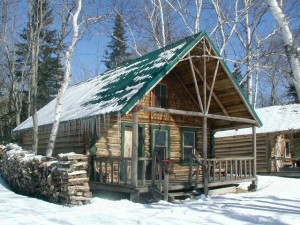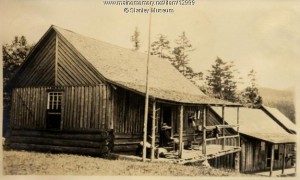“There are serious challenges facing the sporting camp industry today” – State of Maine Comprehensive Land Use Plan, 2007
“Continued operation of sporting camps contributes not only to local and regional economies, but also benefits the tourism industry throughout the State” – Resolution of Maine’s 112th Legislature
For over 150 years, Maine’s sporting camps have served the outdoor public by offering non-exclusive lodging, meals and recreational access to some of the State’s most beautiful and remote natural locations.
This heritage has been seriously threatened by changes in land ownership and land management policies, high land valuations and taxes, lack of long term land leases, business complexities and regulation, lack of affordable capital, encroaching development and lack of access to lands and waters where visitors may enjoy their favorite recreational activities.
In 1904 there were at least 300 sporting camps in operation in Maine. By 2007, this number had dwindled to fewer than 40. As more commercial camps are lost, this unique part of Maine’s cultural heritage comes dangerously close to losing its critical mass and disappearing altogether — taking with it the valuable public services sporting camps provide and the vital role they play in Maine’s rural economy and outdoor traditions.
Maine’s Rural Economy & Job Opportunities
Most of Maine’s surviving sporting camps are located in what is called Maine’s “Unorganized Territories” that comprise most of Maine’s most remote and poorest Counties – Aroostook, Franklin, Oxford, Penobscot, Piscataquis, Somersetlie and Washington Counties.
The US Congress established the Northern Border Region Commission to focus more attention on the needs of this “ecomomically distressed” region. While beautiful to see and visit, the region depends mostly on commercial forestry for its jobs, and lacks a broadly thriving business economy. Jobs are few and far between, and incomes are well below the state and national averages.
As recognized by the State Legislature, sporting camps provide an important part in the regions economy – in fact, the whole state’s economy.
Maine Relies on Small Businesses
Sporting camps are by nature small family owned and run businesses. Many owners refer to their business as a “lifestyle” choice rather that a money-making enterprise. Like many small business owners, business and marketing expertise is often lacking. Yet a sporting camp represents a significant asset that must earn enough to sustain itself. Otherwise, a slow degradation process sets in and one day the camp will ceases to exist, or be sold for development purposes.
Sporting camp operators and employees need help to better manage their operations and market their camps in an economic environment where it appears that the interest in traditional sporting camp activities such as fishing and hunting is waning. Working with our partner organizations, the Foundation provides meaningful information and technical assistance to camp owners on topics ranging from general business, marketing and advertising, new product and service offerings, and preparing business plans and budgets.
Over Taxation and Over Regulation
Tax and regulation policies are forcing sporting camps to close. When a camp closes, we all lose the opportunity to partake in our traditional outdoor recreations or to enjoy these special natural settings.
At one time, sporting camps paid very low and affordable property taxes. Camps were able to generate sufficient income to pay the tax. This is not true today.
Maine’s current property tax policies have greatly harmed the industry. Properties are valued, and therefore taxed, based on the best and highest use. This no longer means the value as a public recreation facility. It now means the value as if sold for either commercial real estate development, or as a privately owned “compound” for the exclusive use of its owners.
In order to keep up with the exhorbitant property tax assesments for these waterfront properties, many sporting camp owners are forced to choose between paying the tax in lieu of maintaining the facilities, or outright selling the property and seeing it converted into non-commercial use. Many of Maine’s sporting camps have already been converted into exclusive-use private vacation properties by wealthy persons who are able to buy these typically waterfront properties at prices far higher than a commercial sporting camp business could support.
Outdoor Traditions Adrift
The “Sporting Camp Experience” is as unique today as it was 150 years ago. These family-run businesses offer rustic cabins surrounded by fantastic wild scenery and wildlife; lost art of providing hearty home-cooked meals and pastrys, safe family vacation settings, and traditional outdoor recreation like fishing, hunting, hiking and wildlife watching.
The urbanized public has few opportunities to learn about traditional Maine sporting camps and the important role they play in Maine’s history, cultural heritage and economic well-being. Sporting camp visitors once led the way in conservation effort that has preserve Maine’s natural resources and the undeveloped, pristine surroundings that sporting camps rely upon.
The continued existence of sporting camps provides the public with access to these natural resources, and gives people the chance to experience and then value our outdoor traditions and natural resources.
Open Space & Habitat Loss
Maine’s Sporting Camps were established 100 to 150 years ago in locations then surrounded by miles and miles of forest and wetland habitat. “Development” was absent, rare plants were undisturbed, and wildlife like deer, moose, caribou, lynx, black bear, pine marten, eagles, salmon, and brook trout were plentiful. The natural habitat that provided for wildlife also made it possible for sporting camps to sustain their existence as attractive places for outdoor recreation and enrichment.
Maine Sporting Camps and their surrounding habitats face serious challenges today. Changes in land ownership and land management policies, high land valuations and taxes, and encroaching development all threaten the future of Maine’s remaining Sporting Camps.



